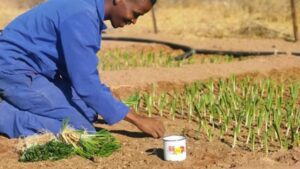
By:Annakleta Haikera
Official opposition leader Mchenry Venaani has raised concerns about the lack of support and access to funding and resources for small and medium-sized enterprises (SMEs) in the rural areas of the country.
Venaani said SMEs play a crucial role in driving economic growth, creating employment opportunities, and fostering local development.
“It is common cause that SME development is the invaluable key to reduce poverty by accelerating economic growth, and promoting and empowering the poor, women and the disabled so that they can escape malnutrition, hunger and diseases,” he said in a statement released on Tuesday.
Last year, the Development Bank of Namibia (DBN) gave the Ministry of Youth, Sport and National Service a N$8 million soft loan to fund 28 rural entrepreneurs of the initial 121 project presented.
According to Venaani, government should establish dedicated funds that provide affordable financing options for rural SMEs, including low-interest loans and grants, to enable them to invest in infrastructure, technology, and human resources.
“Collaborate with local business associations, chambers of commerce, and educational institutions to create coaching and mentoring programmes tailored to the unique needs of rural SMEs. These programmes should focus on business development, financial management and market access,” Venaani suggested.
Meanwhile, Hendrina Nujoma, a crochet knitting businesswoman in the Mpungu area in Kavango West region, told The Villager that, “Villagers lack access to essential funding in various aspects, maybe this is because they are far from towns and don’t have enough collateral to be funded by any bank. So they opt not to take loan for they’re small SME business.”
Nujoma said only few businesses are registered in the rural areas and the support from customers is very poor.
“However, the economy has become so bad that people from the villages only depend on government grants and it makes it very difficult for them to save money. I feel the government doesn’t pay attention to those who are in rural areas because they think people here lack knowledge or education. I also think that people here don’t know which doors to knock when they need business opportunities,” Nujoma said.
Willem Hausiku, who operates a small garden business, told The Villager that people who are operating small-scale businesses in rural areas are faced with many challenges. He did not elaborate.
He further said the Covid-19 period also contributed to the fact that business opportunities are not given to those that really need it but to those in town and who are already having enough money to fund their already well-established businesses.
Hausiku said there are grants and money for SMEs but it’s very hard to get such from the bank.
“The competition is very high and only few people benefit and those are the people with enough knowledge and have established their businesses. For us in the rural areas, we don’t fit in any of those bank’s grants. I have tried applying for many opportunities to grow my business but I have not succeeded in any of those opportunities,” he said.
“SMEs are a major source for generating employment, creation of wealth and alleviating poverty for people in rural areas but we have to struggle to get the finances that we need to grow our small business. “It’s hard how one can just have a few people coming to your business to buy but then they set prices for you, but if your business is funded then at least one cannot make so much losses,” Hausiku said.
According to the Namibia Statistics Agency, the country’s labour force survey of 2018 found that there were 876, 908 youth, aged 15 to 34 in Namibia, of which 310,854 (35.4%) were employed and 265,770 (30.3%) were unemployed.
Of this figure, 115,263 unemployed youth were in rural areas.









Comments